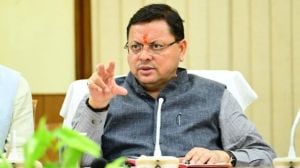43s War and 44s Endgame
Bush reveals little new on the Iraq War,nor explains himself enough; he just conveys what its like to be George W. His successor,warns Bob Woodwards insider account,has no easy way out of Af-Pak.
A great conflict can be sensed in George W Bushs much-awaited memoir. He cannot seem to make up his mind whether hed like to be his usual chatty Dubya self or assume a presidential demeanor. And voice,he indicates,is important. He says that in his last year in the White House,he began to think about the memoir,and Karl Rove helpfully set up meetings with more than a dozen distinguished historians. The historians more or less agreed that Bush should read
Ulysses S Grants Memoirs,and he did. He was arrested by Grants distinctive voice and anecdotal narrative: I could see why his work had endured.
So,inevitably,this book is structured around key decisions he made,and why he did,in order to convey what it was like to be the US president for eight consequential years. And,somewhat alarmingly for the reader: Perhaps it book will even prove useful as you make choices in your life.
The call hed prefer you to put on hold,however,is a judgment on his record: Whatever the verdict on my presidency,Im comfortable with the fact that I wont be around to hear it. Thats a decision point only history will reach. After all,when he read
Presidential Courage by Michael R. Beschloss in 2007,he told his wife Laura: If they are still assessing George Washingtons legacy more than two centuries after he left office,this George W doesnt have to worry about todays headlines.
The other George W and other great US presidents are invoked often to make the point that his were not everyday decisions. Theres also always Dad,George Bush Sr,with his counsel and affection; and in Bush Jrs recollection,eerie parallels between 41 and 43. For example: After the passenger planes hit their targets on September 11,2001,he improvised his written address to say,terrorism against our nation will not stand. Later he was struck by the echo of his fathers response to Saddam Husseins Kuwait invasion: his aggression will not stand. Writes 43: Dads words must have been buried in my subconscious,waiting to surface during another moment of crisis.
George W. voices irritation at the speculation thats trailed him about his relationship with Dad. Yet,there is a subtext to the manner in which his very consequential decision-making is recounted the Iraq and Afghanistan wars,stem cell research,beating his drinking habit I have a habitual personality,Katrina,etc. You wonder if its the social network that allows him such breeziness about such grave subjects.
This book breaks no big news. The stories of the war plans have been mined by Bob Woodward whos moved on to Obamas wars. The minor scoops are about people,and anecdotes are helpfully strewn across chapters. Donald Rumsfeld may have been replaced earlier. Bush may have run for his second term without Dick Cheney. Some incidents confirm popular stereotypes. As the Afghanistan invasion was being planned,Paul Wolfowitz actually suggested that we consider confronting Iraq as well as the Taliban. Dealing with Iraq would show a major commitment to anti-terrorism, Rumsfeld chimed in. But Colin Powell and the CIA director cautioned against the idea. Cheney counselled that the two targets be staggered. Bush welcomed the vigorous debate,and he emphasises that he wanted a diplomatic solution on Iraq.
The telling is mostly to the expected script and the great value of the book is how Bush internalised the developments as they happened.
As you read his Mush-Bush style encounters with Pervez Musharraf,you also have to ask,couldnt the Americans have been more open-eyed to the Taliban revival in Pakistan? Musharraf heard out Bushs sad nations request in the aftermath of 9/11 and committed to removing the Taliban from Afghanistan. But as reports of Al Qaeda and Taliban forces escaping to Pakistan came in,Bush suggested sending in American Special Forces. Musharraf told me that sending American troops into combat in Pakistan would be viewed as a violation of Pakistani sovereignty. A revolt would likely ensue. His government would probably fall. The extremists could take over the country,including its nuclear arsenal8230; In that case,I told him,his soldiers needed to take the lead. For several years,the arrangement worked.
And then: Over time,it became clear that Musharraf either would not or could not fulfill all his promises. There was Pakistans obsession with India,Pakistani forces pursued the Taliban much less aggressively than they pursued Al Qaeda. Bush advised him to shed his military affiliation and govern as a president. He promised to do it. But he wasnt in much of a hurry. Meanwhile,after a visit to India to sign the nuclear cooperation agreement which he lists as his big foreign policy success,he visited Pakistan and picked up cricket lingo. There is later a riveting description of the barbs that flew between Musharraf and Hamid Karzai when he hosted them in Washington.
But if Afghanistan was a nation building mission that Bush would like his successor to stay with,the account of the road to the Iraq war betrays none of the Blair and Clinton consensus on liberal interventionism. On the eventually non-existent WMD: When Saddam didnt use WMD on our troops,I was relieved. When we didnt discover the stockpile soon after the fall of Baghdad,I was surprised. When the whole summer passed without finding any,I was alarmed. The press corps constantly raised the question,Where are the WMD? I was asking the same thing. And: No one was more shocked or angry than I was when we didnt find the weapons. I had a sickening feeling every time I thought about it. I still do.
Yet,there is an ambivalence on whether Saddams removal was crucial. At one point Bush says the US,the Middle East and Iraq are nonetheless the better for it. Then again,why didnt Saddam come clean on the WMD? His debriefing by the FBI yielded the theory that Saddam was more concerned about not appearing weak to Iran than the possibility of invasion. Writes Bush: Im not sure what more I could have done to show Saddam I meant what I said8230; We deployed 150,000 troops to his border. I gave him a final forty-eight hours notice that we were about to invade his country. How much clearer could I have been?
The tenor is indicative of the books overall theme. Bushs eye is on the long arc of history,and what regrets he has are about how things turned out military tribunals,the failure to shut Guantanamo in his second term,Abu Ghraib outrage. To not read the book is not an option. But dont read it for the big debates. Read it for Bushs telling of events as they unfolded. You wont appreciate him any more or perhaps any less than you already do. But you may figure him out a bit. Maybe.
C Raja Mohan
In his address to the joint session of the Parliament on Monday,US President Barack Obama sought to reassure India that America will not cut and run from Afghanistan from the middle of next year. While I have made it clear that American forces will begin the transition to Afghan responsibility next summer,Ive also made it clear that Americas commitment to the Afghan people will endure. The United States will not abandon the people of Afghanistan or the region to violent extremists who threaten us all. A handful in the audience who might have read Bob Woodwards story on the making of Obamas Afghan policy would have had no reason at all to be reassured. They would have known that the President was not making a definitive policy statement,but putting the best possible public construction on his inability to frame a coherent Afghan strategy. They would also know that what the president might say today on Afghanistan might not necessarily hold next year.For all those interested in Indias new engagement with the United States and recognise Delhis high stakes in the outcome of Obamas war in the north-western subcontinent,Woodwards tale is a fascinating one.As the ultimate insider in Washington,Woodward has extraordinary access to decision-makers,a fact that is evident in his earlier insightful accounts of big policy battles in recent administrations.The value of Woodwards work as the first draft of history has been criticised by many in America. One charge is that he is like a court historian who makes his patron in the White House look good. And that the sources who dont speak to him end up looking not so good in his narratives.Woodwards latest book has come in for severe criticism; some have called it a dump from the laptop to the printing press; that it has no beginning and end,let alone context or substantive analysis; that the title of this rushed volume is misleading,because the book deals with only one war,in Afghanistan.Whatever its faults,the book raises many interesting questions for the Indian reader. Why is it that an inside account of Obamas Afghan policy comes out in Washington even before the President has finished his second year in office,while nothing of consequence ever comes out in Delhi?While official Delhi too leaks in dribs and drabs,and bits of information are traded between the system and the media,it is never easy to get a reasonable account of decision-making on Indias national security.Delhi does not compensate for closed structures of national security by declassifying documents after a fixed period,say 30 years. Put simply,nothing that goes on inside ever gets out to either journalists doing the first draft or historians writing a more informed cut.One source of difference is that unlike the permanent bureaucracy that dominates the Indian system,in America,it is a directly elected president,the aides he brings to the White House,and outsiders at the senior levels of the bureaucracy who come for short stints that make for a dynamic,if chaotic,policy-making.
On Afghanistan,Woodward gives us the full flavour of the tension between the President,his political aides who have an eye on the election,military advisers who wish to protect their long-term institutional reputation and interest,the vice-president who caters to the concerns of the liberal wing of the Democratic Party,and Defence Secretary Robert Gates and Secretary of State Hillary Clinton,who back the muscular approach.
The insights into these debates should be of great interest to the Indian political class and security establishment. For far too long,they have seen the US as some kind of a black box,a coherent force with clear aims and the will to achieve them.
The Indian chatterati,which is aware of the unceasing contestation for power between different groups and institutions in its domestic politics,has had little inclination to understand a similar dynamic in the US. Woodward offers rare political insights into the struggle at the highest levels in Washington to define the Afghanistan policy. As Indias engagement with the United States intensifies,Delhi will need greater skill and imagination to navigate the political and bureaucratic battles in Washington.
During his election campaign,Obama called the Afghan intervention a war of necessity as he attacked his Republican predecessor,George W Bush,for fighting the wrong war of choice in Iraq.
It was a good political move,since it allowed Obama to cover his right flank and prevent the Republicans from accusing him of being weak on defence. But it was quite clear that his liberal political instinct told him that it would be disastrous to commit the United States to a prolonged war in Afghanistan.
Taking charge of the White House,Obama was tied down by this irresolvable contradiction that is also at the heart of Woodwards story.
Internally,Obamas main challenge was to convince the Pentagon to accept a short time-frame and limited resources to achieve modest objectives in Afghanistan. If Obamas domestic political calculus demanded an early exit without too much cost,the Pentagon was not willing to submit its operations and doctrine to the political calendar and convenience of the President.
Woodwards story tells us how deep the problems of civil-military relations in the worlds oldest democracy are. Leon Panetta,the director of the Central Intelligence Agency,told Obama,No Democratic President can go against military advice So just do it. Do what they say.
For most readers,it is the Pakistan question that is of considerable interest. Woodwards story suggests that the situation is a lot more depressing than we think. The Obama administration is fully aware of the complicity of the Pakistan Army in promoting insurgencies in Afghanistan and India,but is deeply frustrated at its inability to change the latter.
Obama recognises the cancer of terrorism that has taken root in Pakistan and his military advisers have plans for retribution in the event of a terror attack against US targets being traced to Pakistan. But he might not be able to deliver much change in Rawalpindis behaviour.
That would make Indias task of dealing with Pakistan in the coming years a lot more difficult. Woodwards account of Obamas Afghan policy suggests the urgency of Delhi thinking creatively and asymmetrically in dealing with the challenges to Indias national security from Pakistan.
- 01
- 02
- 03
- 04
- 05































